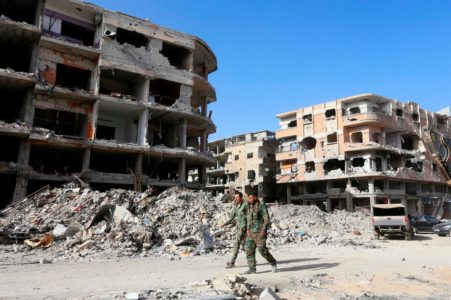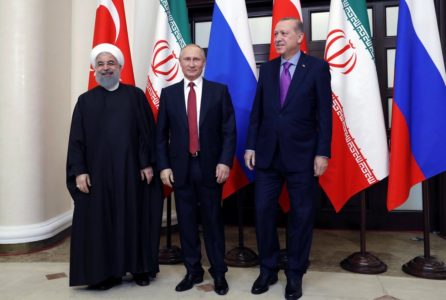Throwing in the towel on Syria
What EU’s exclusion of Iran from sanctions list says about the Syrian civil war

Gone are the days when intervention in conflict-torn countries sought to end a war, rather than intensify it. After the ramifications of Afghanistan, Iraq, and Libya, it’s no wonder the EU is hesitant to become militarily involved in failed or failing states. Some people approach the Syrian civil war with the belief that it will turn out just like the other Middle Eastern countries. But there is an important difference to be drawn between them—Syria’s situation entails a government using weapons of mass destruction against its civilians. And there are numerous powers that have contributed to the Syrian government’s war effort, as well as attempted to protect it from a military response by the UN Security Council by consistently exercising their veto powers.
Syrian President Bashar al-Assad’s use of chemical weapons against Syrian civilians was an action difficult to fathom. Now, eight years have passed and the war has become an internationalized civil war, with numerous international actors involved for a number of complicated reasons. Iran is clashing with Israel because of long-standing tensions; Turkey is targeting Kurdish units in Syria because it feels Kurdish success strengthens emboldens their separatist movement; the US is clashing with Turkey because of the US’s support for the Kurds; Russia is fighting the US because of Moscow’s support for Assad; and somewhere in between, this group of international actors are split down the middle over disagreements on whether Syria’s future entails an Islamic state or a secular state.
As for Europe? Europe is largely marginalized in making an impact on the outcome of the war. Despite the European Union existing to create peace and stability within Europe, its struggling to remedy, better yet contain, the lack thereof beyond its borders and its collateral damage is pouring into its own society with the influx in refugees. The European Union, in an attempt to halt the Syrian regime and its supporters from further destruction, has extended sanctions against these figures until 1stJune 2019. However, the list continues to exclude any Iranian figures. Any person who wants to see an end to this war would angrily ask, “well, why the hell not?” Iran, along with Russia, has been fighting side-by-side with President Assad, with upwards of $30 billion invested in the effort. Its role is becoming larger and larger, and at this point, the chances of Iran withdrawing are little to none.
The European Union has established numerous objectives in Syria that would rebuild destroyed infrastructure and institutions, with a desire of seeing an end to the conflict through political transition. But the problem about today is we talk a lot about remedying symptoms and don’t do enough to address the causes. Syria is one of the worst humanitarian disasters since WWII and the EU has proved to be extremely effective in delivering humanitarian aid. But when it comes to causes, the EU lacks the ability to act.
What is the cause? Aside from a government that is guilty of using chemical weapons against its own citizens and the presence of extremist terrorist groups—it’s the complex array of international actors who have sought Syrian soil as a stadium for their proxy wars. Even more dangerous is the blurred division between the war criminals and the intervening governments because Syria has become a place where bombing civilian infrastructure is the same as destroying terrorist targets. As it goes on, the belief that nobody will stand in the way of these actors will further influence them to use Syria as their battlefield.
So, when asking “why are no Iranians being sanctioned for their participation in the war?”, one should also ask “why are we not sanctioning Russia? Or Turkey? Or the US?” because their presence has further deteriorated the situation. Quick answer: because the EU knows it cannot end such a complex conflict and instead resorts to using political rhetoric, such as “condemning” or “sanctioning”, to feel like it is doing something, even if it isn’t enough.

For the EU, another priority on the list (that has not yet failed) is ensuring its own security. European security must come before Middle Eastern security, and with the Iranian nuclear deal at stake, they must convince Iran to stay in the deal, even if it means excluding it from the sanctions list against the Syrian government and its supporters. But the EU is not the only figure to blame for this concession—President Trump’s decision to withdraw from the nuclear deal undermines Europe’s stance towards Iran and the lack of a united front is weakening the position Europe can take. Now countries are scramming to do what they can to prevent a rise in another international security threat. As a result, tyrants are getting away with crimes because we must sacrifice moral principles for other interests, such as security within our own borders.
But putting the pessimism aside, the EU should not give up on the conflict because it has a unique position that the other powers do not—its hands are not tied in a proxy war being fought on Syrian soil. Luckily, Europe is set on finding a political solution rather than a military solution so it won’t be increasing the number of armies on the ground. Even more beneficial is the great clout the European Union’s actions have against other states. But it must figure out the best way to conduct this clout. At this point, the chances of Europe persuading President Assad to put an end to his actions are far-fetched, but as the EU’s Foreign Policy Chief Federica Mogherini noted, the EU does have leverage against Syria’s allies—Iran, Russia and Turkey. Whether this leverage comes in the form of soft power or hard power is something that EU officials will have to deeply consider now that the U.S. seems to be moving in a different direction.
Regardless, the EU should not throw in the towel on the Syrian conflict. Doing so will show criminals like Assad that, when the going gets tough, the international community will cave under the pressure. Syria will either break us or make us—and I hope it will be the latter because the world will become a much more insecure place unless we show that in the face of threat, the countries of the world can stand together against it. If we don’t, it will haunt us because, as guardian columnist Natalie Nougayrède boldly declares, “we are connected to these atrocities in ways that go beyond our on-and-off capacity for indignation as we sit watching television images of children being bombed in their hospital beds in eastern Ghouta.”
